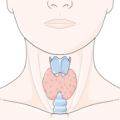It is well-documented in research that some digestive problems, such as irritable bowel syndrome (IBS), Crohn’s disease, gastroparesis, and gallstones, are more common in women than men. Others occur equally in both sexes, but affect women more severely.[1] I know far more women than men with digestive issues and wondered why this was so, especially since I suffer from a pancreatic-biliary condition called Sphincter of Oddi Dysfunction (SOD) where 75-95% of sufferers are women.
Female Anatomy: An Opportunity for Digestive Issues
The exact nature of why women experience more digestive problems than men is not always clear. Though much about these digestive differences is still a mystery, there are two prominent differences: women’s anatomy and hormones. The ovaries and uterus are located below the intestines in women’s anatomy. Since the intestines are such close neighbors, conditions affecting the uterus and ovaries may also affect the intestines.
Two examples of this are endometriosis and referred pain. Endometriosis, a collection of built up and shed uterine tissue, can spread outside the female organs. Endometriosis can affect the intestines, where endometrial tissue may cause intestinal blockage. However, it can also spread and attach to other digestive organs as far up as the pancreas and liver though this is rare. Also, the close proximity of the uterus to the colon may cause a situation of “referred pain” or sensitivity between the two organs. The uterus and colon share central nervous system neuronal activity partly through the hypogastric nerve.[2] Therefore, pain and sensitivity in the uterus can refer to the colon and vice versa.
Cycling Hormones Contribute to Digestive Difficulties
The other prominent difference is in women’s hormones. In many ways, these hormones work in concert with the digestive system to work properly. The imbalances of estradiol and progesterone can influence the movement of food through the intestines—some by speeding the process up, causing diarrhea, nausea and abdominal pain; and others by slowing things down and causing bloating and constipation.[3]
Estrogens can significantly alter various clinical manifestations of IBS, including changes in motility (intestinal movement) and visceral hypersensitivity (pain).[4] In the case of visceral hypersensitivity, even the slightest pain-inducing alterations in the esophagus, small intestine, colon, rectum, and pancreatic/biliary region can be more painful in women than men.
I and many other women (rarely men) have at one time or another been told by a physician our digestive symptoms were “all in our heads”. This female labeling could not be further from the truth. Ovarian hormones can alter pain processing by interacting with neuromodulator systems and the emotional system responsible for visceral pain perception. Estradiol can cause hyper-responsiveness to stress which may promote immune activation and impairments of gut barrier function.[5] In other words, our hormones may very well be responsible for the onset of these conditions and the exacerbation of symptoms.
Probably the most obvious affect women’s hormones have on the digestive system is estradiol’s effect on the gallbladder. Women are twice as likely as men to have gallstones because estradiol raises cholesterol levels in the bile and slows gallbladder movement.[6] Female hormones have also been tied to other liver and biliary diseases, along with pancreatic conditions like pancreatitis.
Pregnancy and Progesterone
Women are at higher risk of developing gallstones during pregnancy. This is because estrogen concentrations (estrone, estradiol and estriol) are high. Pregnant women experience other hormone-related symptoms. In the first trimester, morning sickness can be debilitating. No one knows the exact cause of morning sickness but hormone fluctuations have long been suspected. Later in the pregnancy, an increase in the hormone progesterone contributes to constipation by slowing the waves of muscle contractions that move food down the digestive tract.[7] In addition, progesterone causes the stomach’s esophageal valve to relax, causing gastroesophageal reflux disease (GERD), where food and acid move up into the esophagus. Since progesterone relaxes many of our muscles this may be the reason some women with my condition, SOD, find relief from symptoms during pregnancy. SOD is a disorder where the biliary and/or pancreatic sphincters spasm shut causing pain and other symptoms.
What is the Solution?
The long and short of it is there is no one solution. No one size fits all. Everyone is different. I have had surgeries and conventional treatments for my digestive conditions that proved helpful. However, in many instances when symptoms were not completely disabling, I experienced just as effective, lasting relief through natural remedies and medications. Practicing deep breathing, meditation, yoga, and mindfulness have helped immensely. Finding the right diet and sticking to it has always been a challenge, but if I eliminate even a few known food triggers, I am much better off. Dieting, stress, anxiety, depression, and exercise can drastically affect hormones—both for the good and bad. Therefore, addressing these factors can help digestion indirectly by “repairing” hormone problems.
Although some supplements and medications may be helpful, be careful. I have experienced horrible secondary conditions and adverse reactions from herbal supplements, medications, and even some vitamins and minerals that purported to aid my digestive problems. Be cautious. Less is more with pills—even the herbal kind.
In conclusion, besides the estrogens and progesterone, there are other female-dominant hormones like human gonadotropic hormone, luteinizing hormone, and prolactin which may affect the digestive system. Studies are sparse regarding the role of progesterone and the estrogens on the digestive system, and almost non-existent for these rarely talked about hormones. Therefore, research is desperately needed in the field of hormones and digestive health. I believe once we unlock some of the mysteries surrounding hormones and the digestive system we will uncover a treasure trove of treatments and cures.
We Need Your Help
More people than ever are reading Hormones Matter, a testament to the need for independent voices in health and medicine. We are not funded and accept limited advertising. Unlike many health sites, we don’t force you to purchase a subscription. We believe health information should be open to all. If you read Hormones Matter, like it, please help support it. Contribute now.
Yes, I would like to support Hormones Matter.
References
- U.S. Office on Women’s Health.
- Winnard, KP, et al. “Cross-organ interactions between reproductive, gastrointestinal, and urinary
tracts: modulation by estrous stage and involvement of the hypogastric nerve”. American Journal of Physiology. 2006 Dec;291(6):R1592-601. Epub 2006 Aug 31. - “Digesting It All!” Connections: An Educational Resource for Women’s International Pharmacy.
- Mulak, A and Tache, Y. “Sex difference in irritable bowel syndrome: do gonadal hormones play a role?” Gastroenterology Poland. 2010;17(2):89-97.
- Meleine, M and Matricon, J. “Review article: Associations between immune activation, intestinal permeability and the irritable bowel syndrome”. World J Gastroenterol. 2014 Jun 14;20(22):6725-43. doi: 10.3748/wjg.v20.i22.6725.
- Stinton, L. and Shaffer, E. “Epidemiology of Gallbladder Disease: Cholelithiasis and Cancer”. Gut Liver. 2012 Apr; 6(2): 172–187.
- Lingen, J. “The Second Trimester: Constipation, Gas, & Heartburn”. Healthline. March 5, 2012.
This article was published previously on Hormones Matter in September 2015.
















Read Ageless the naked truth about bioidentical hormones,by Suzanne Sommers she and 6 other Doctors in this book will explain why, to all the questions you just asked.After having my gallbladder out for no reason , no stones or anything, just attacks, chronic constipation, hypothyroid, sudden really painful fibromyaglia, and now sudden on set of GP, I now know its all related to HORMONES! I am seeing a Bioidentical Hormone specialist next month.Wish me luck.The book convinced me in the first 3 chapters.Go to the library.
Another cause of digestive problems, specifically bowel problems, is hysterectomy, one of the most overused procedures in the U.S. Bladder problems are also common. There are other problems too since the uterus and ovaries have lifelong non-reproductive functions. The reason for bladder and bowel problems is that the uterus is an anchor for the bladder and bowel and separates them. When the uterus is removed, the bladder and bowel drop and no longer have the uterus separating them. This causes altered function as well as an increased risk for prolapse and incontinence. You can read all my articles here https://www.hormonesmatter.com/author/ws/.
I get pretty excited when I see others connecting hormones and SOD. I too have suffered with SOD. With the help of my Dr. we have balanced my hormones and I am pain free. It needs management. It isn’t like a cold that you get over, it’s more like diabetes in as much as it is always there but can be effectively managed. My estrogen tested very high and progesterone was very low. I 100% agree that hormones effect SOD. I would love to see more research done. I did find 2 studies on pubmed.gov that tested hormone/SOD effects on pigs and prairie dogs that I used to present this theory to my Dr. Thank God I have an open minded Dr.
Good luck to you and all who suffer with this debilitating condition. I hope relief finds you soon.
Robin
Hi Robin, Would you be interested in sharing your story. This is such a poorly understood condition, your insight would help a lot of women. You can contact us via: http://www.hormonesmatter.com/write-for-hormones-matter/
Please tell me what you take to balance your hormones. What tests did you have?